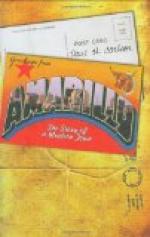Tilly Louder came home from the Lossing factory (where she is a typewriter) one February afternoon. As she turned the corner, she was face to the river, which is not so full of shipping in winter that one cannot see the steel-blue glint of the water. Back of her the brick paved street climbed the hill, under a shapeless arch of trees. The remorseless pencil of a railway has drawn black lines at the foot of the hill; and, all day and all night, slender red bars rise and sink in their black sockets, to the accompaniment of the outcry of tortured steam. All day, if not all night, the crooked pole slips up and down the trolley wire, as the yellow cars rattle, and flash, and clang a spiteful little bell, that sounds like a soprano bark, over the crossings.
It is customary in the Lossing Building to say, “We are so handy to the cars.” The street is a handsome street, not free from dingy old brick boxes of stores below the railway, but fast replacing them with fairer structures. The Lossing Building has the wide arches, the recessed doors, the balconies and the colonnades of modern business architecture. The occupants are very proud of the balconies, in particular; and, summer days, these will be a mass of greenery and bright tints. To-day, it was so warm, February day though it was, that some of the potted plants were sunning themselves outside the windows.
Tilly could see them if she craned her neck. There were some bouvardias and fuchsias of her mother’s among them.
“It is a pretty building,” said Tilly; and, for some reason, she frowned.
She was a young woman, but not a very young woman. Her figure was slim, and she looked better in loose waists than in tightly fitted gowns. She wore a dark green gown with a black jacket, and a scarlet shirt-waist underneath. Her face was long, with square chin and high cheek-bones, and thin, firm lips; yet she was comely, because of her lustrous black hair, her clear, gray eyes, and her charming, fair skin. She had another gift: everything about her was daintily neat; at first glance one said, “Here is a person who has spent pains, if not money, on her toilet.”
By this time Tilly was entering the Lossing Building. Half-way up the stairway a hand plucked her skirts. The hand belonged to a tired-faced woman in black, on whose breast glittered a little crowd of pins and threaded needles, like the insignia of an Order of Toil.
“Please excuse me, Miss Tilly,” said the woman, at the same time presenting a flat package in brown paper, “but will you give this pattern back to your mother. I am so very much obliged. I don’t know how I would git along without your mother, Tilly.”
“I’ll give the pattern to her,” said Tilly, and she pursued her way.
Not very far. A stout woman and a thin young man, with long, wavy, red hair, awaited her on the landing. The woman held a plate of cake which she thrust at Tilly the instant they were on the same level, saying: “The cake was just splendid, tell your mother; it’s a lovely recipe, and will you tell her to take this, and see how well I succeeded?”




